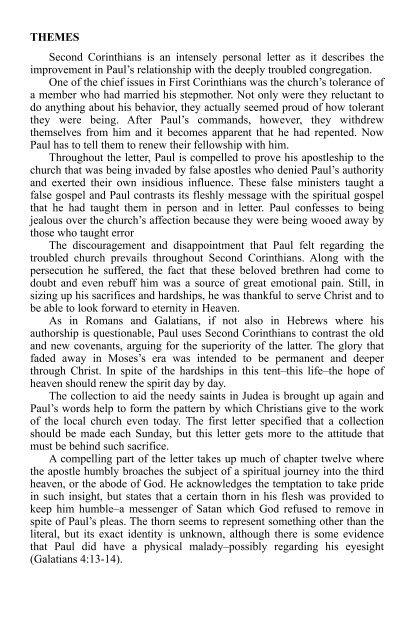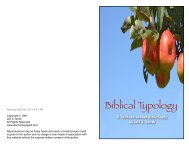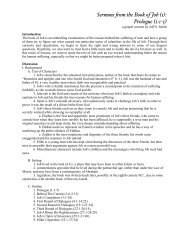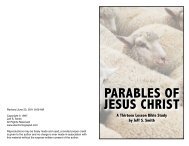New Testament Study Guides - ElectronicGospel
New Testament Study Guides - ElectronicGospel
New Testament Study Guides - ElectronicGospel
You also want an ePaper? Increase the reach of your titles
YUMPU automatically turns print PDFs into web optimized ePapers that Google loves.
THEMES<br />
Second Corinthians is an intensely personal letter as it describes the<br />
improvement in Paul’s relationship with the deeply troubled congregation.<br />
One of the chief issues in First Corinthians was the church’s tolerance of<br />
a member who had married his stepmother. Not only were they reluctant to<br />
do anything about his behavior, they actually seemed proud of how tolerant<br />
they were being. After Paul’s commands, however, they withdrew<br />
themselves from him and it becomes apparent that he had repented. Now<br />
Paul has to tell them to renew their fellowship with him.<br />
Throughout the letter, Paul is compelled to prove his apostleship to the<br />
church that was being invaded by false apostles who denied Paul’s authority<br />
and exerted their own insidious influence. These false ministers taught a<br />
false gospel and Paul contrasts its fleshly message with the spiritual gospel<br />
that he had taught them in person and in letter. Paul confesses to being<br />
jealous over the church’s affection because they were being wooed away by<br />
those who taught error<br />
The discouragement and disappointment that Paul felt regarding the<br />
troubled church prevails throughout Second Corinthians. Along with the<br />
persecution he suffered, the fact that these beloved brethren had come to<br />
doubt and even rebuff him was a source of great emotional pain. Still, in<br />
sizing up his sacrifices and hardships, he was thankful to serve Christ and to<br />
be able to look forward to eternity in Heaven.<br />
As in Romans and Galatians, if not also in Hebrews where his<br />
authorship is questionable, Paul uses Second Corinthians to contrast the old<br />
and new covenants, arguing for the superiority of the latter. The glory that<br />
faded away in Moses’s era was intended to be permanent and deeper<br />
through Christ. In spite of the hardships in this tent–this life–the hope of<br />
heaven should renew the spirit day by day.<br />
The collection to aid the needy saints in Judea is brought up again and<br />
Paul’s words help to form the pattern by which Christians give to the work<br />
of the local church even today. The first letter specified that a collection<br />
should be made each Sunday, but this letter gets more to the attitude that<br />
must be behind such sacrifice.<br />
A compelling part of the letter takes up much of chapter twelve where<br />
the apostle humbly broaches the subject of a spiritual journey into the third<br />
heaven, or the abode of God. He acknowledges the temptation to take pride<br />
in such insight, but states that a certain thorn in his flesh was provided to<br />
keep him humble–a messenger of Satan which God refused to remove in<br />
spite of Paul’s pleas. The thorn seems to represent something other than the<br />
literal, but its exact identity is unknown, although there is some evidence<br />
that Paul did have a physical malady–possibly regarding his eyesight<br />
(Galatians 4:13-14).









